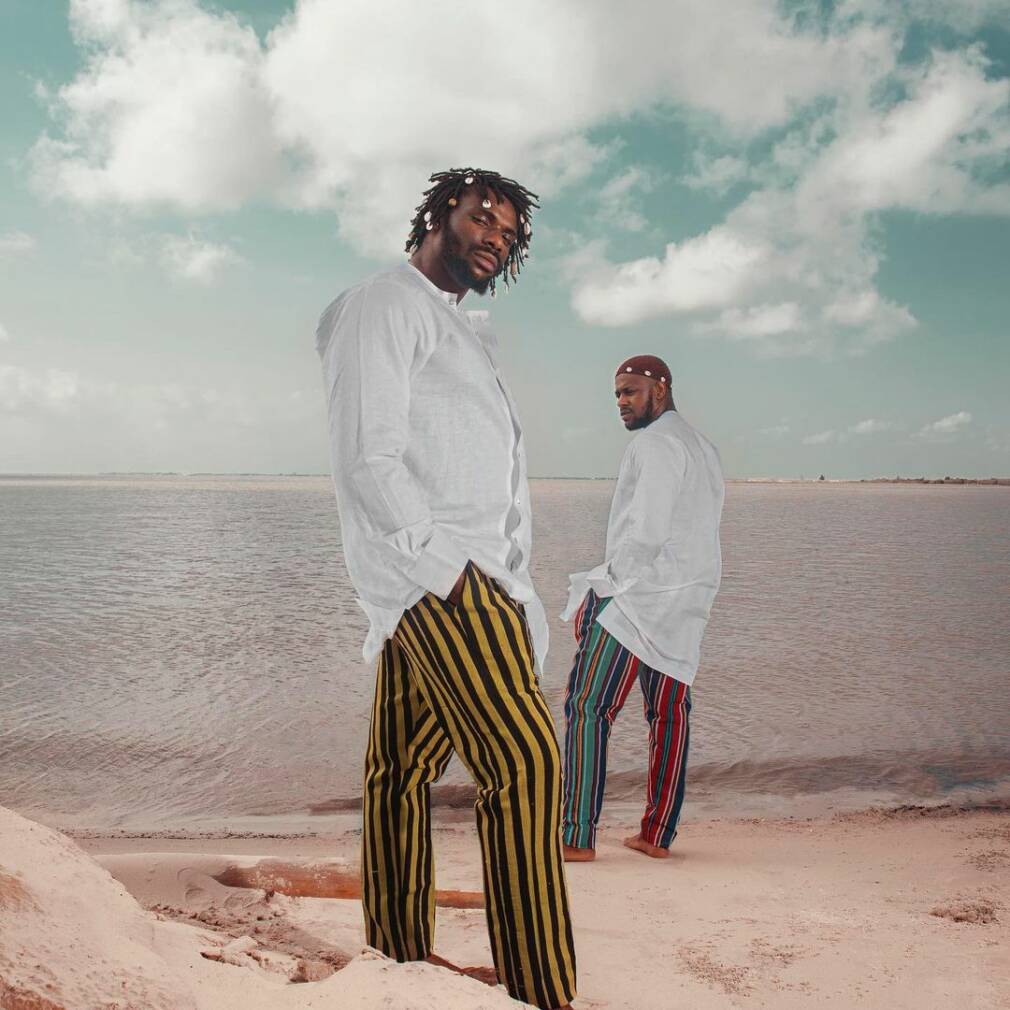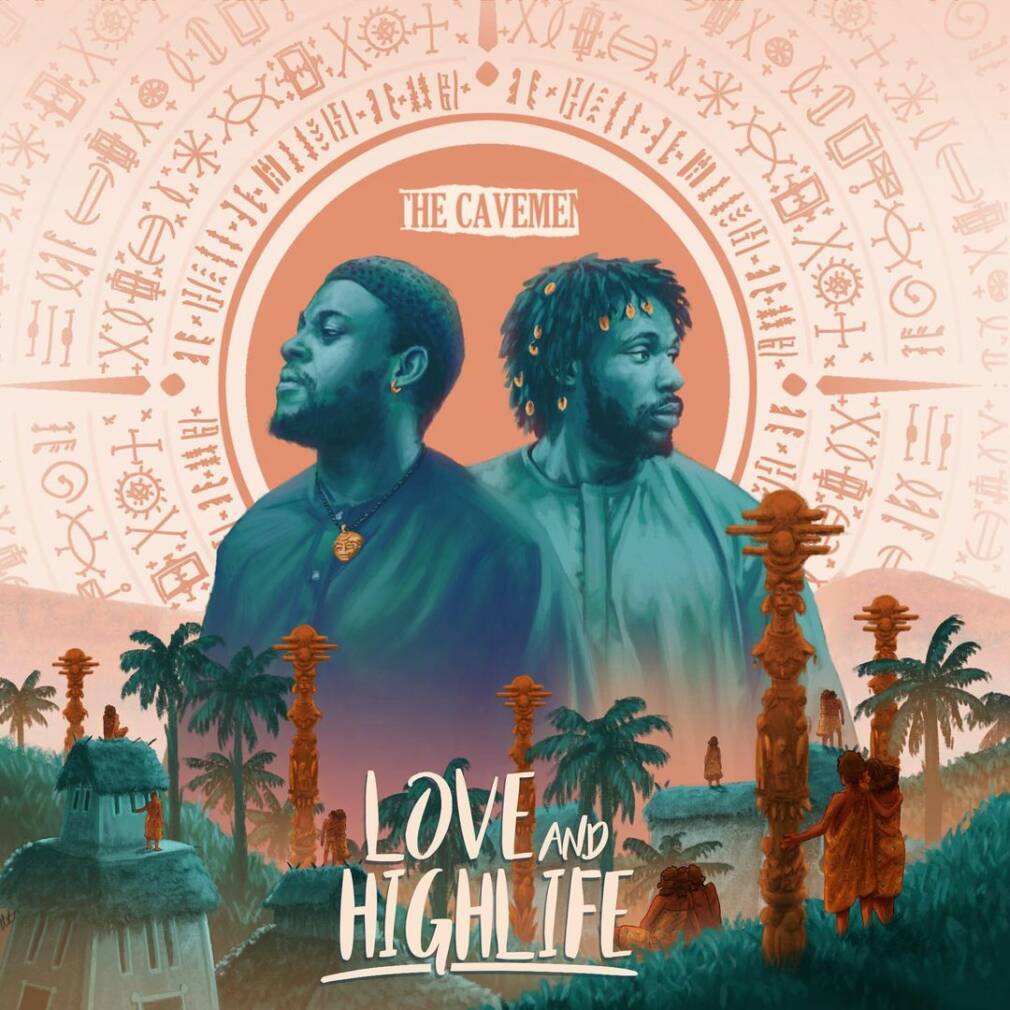“UNA dey feel the groove?” Kingsley Okorie teased the crowd in Pidgin English, greeted with responses of excited screams that pierced through the entire park. It was a cool evening in the highbrow Victoria Island suburbs of Lagos, Africa’s entertainment capital, where over 3000 people were gathered for the grand finale of the StayCavy tour, the first countrywide tour from the fraternal highlife duo, The Cavemen. The air was soaked in euphoria as the singing brothers – composed of bassist Kingsley Okorie, 24, and drummer Benjamin James, 23 – dished out enigmatic live performances of their blooming highlife discography. The energy was electrifying, as the brothers concluded their first headline tour, marking a significant boost in their mission to revive the waning sounds of highlife music.
On this writer’s first visit to the Cave – a fond moniker for the duo’s residence (although it is also disambiguated to associate with the feeling gotten from listening to their music), in the bustling nooks of Ojota, one question puzzled him: how could these brothers create raw, profound highlife music, right in the middle of the tense, and culturally-diverse sceneries in Lagos? Their highlife pioneers and key models had created their music in the eastern part of the country where it is most popular, with only a few exceptions However, the reclusive, soothing, and inspiring sanctuary-esque ambience of their home-cum-rehearsal studio clarified the situation.
With two stellar albums, the award-winning duo have begun to expand their fanbase, promoting the near-extinct melodies of the genre to the younger African generation. They have become storytellers wielding an ancient art style, but with finessed modifications that make it fit better with the hip, ‘woke’, generation of listeners of their era. Who are the Cavemen? Why have they surfaced to frontline the renaissance of one of Africa’s most iconic music genres? And why now?
The Beginning
Highlife music, originally known as palmwine music (popularised as highlife, following the ‘high spiritedness’ that associated its creators and earliest adherents), began at the turn of the 20th century. It started off as an innocent experiment by West-African colonial dockworkers who, out of boredom, fused the Latin harmonies of their Spaniard and Portuguese masters with their own native African rhythms to form the earliest crude version of highlife music.
On the streets of Accra, Liberia, Sierra Leone, and Lagos, it caught on like a virus. The Kwame Asare and his Kumasi Trio, and the Kwaa Mensahs of Ghana, the Irewolede Denge, and Tunde Kings of Nigeria, the Famous Scrubbs of Sierra Leone, among others, started to profoundly explore the melody, in the early 1920’s, creating the first recorded bodies of work of highlife music, as well as adapting the genre into different strains such as ‘Yah Amposah’ style, ‘Dagomba’ style, among others. The sound became very attractive across the West African region, dotting the dancefloors in the nightclubs, communal gatherings, and other various social events in the axis.
In West Africa, it continued to bask in the limelight until the ‘80s and ‘90s when the Western exports of rap music (Biggie, Tupac Shakur), country music (Barry white, Don Moen, etc.), RnB (Whitney Houston, Sade Adu, etc.), among others, began to dominate the music scene. In Nigeria and Ghana, especially, where the most commercially successful highlife proponents such as Osita Osadebe, Rex Lawson, Sir Warrior, Oliver De Coque, among others, the highlife genre had started to fade silently from the spotlight. It was looked upon as ‘old people’ music, with a lacklustre appeal among the blooming millennials of the time. It was only recognized as foundational melodic patterns in the works of Fela Kuti’s Afrobeat, or the pop-heavy variations of Flavour N’abania. Other than that, it had lost all its commercial appeal sometime around the early 2000s. One would need to travel to villages or visit the Orthodox Catholic churches in Nigeria, for instance, to hear highlife, or any of its sub styles.

Birth of the Cave
For the Cavemen., the journey to highlife music started as an unconscious decision by the duo. At that time, Kingsley, who is the elder, and his brother, had started playing music with the sole intention of being instrumentalists. They had both been raised on a steady diet of highlife music, as their father listened to the Osita Osadebes, and Oliver de Coques all around their house, and even their driver blasted it on the car stereo on their way to school. However, they ended up growing up to specialize in other forms of music, until fate fended off the looming distractions and united them as a duo to champion this iconic renaissance.
Benjamin, who is also fondly teased as ‘King of the Cave’, explained that “Creating highlife music was a decision myself and Benjamin made together. We had started listening to music way back. We were composing songs, since we were like 8 or 9 maybe, but it wasn’t highlife. We started with instrumental music, just like what the US band, Snarky Puppy, does. Then we went into pop fusion, like Nico and Vinz. And then there was a song that was given to us by the Most High called Osondu and that changed everything. ‘Osondu’ is not necessarily highlife; you could hear fusions in it, but that was the door. It was the whole decision to know highlife – to go back.”
Their debut, Osondu, is a soulful ode that reflects on man’s journey through life. “Mgbe e na ga ije gi eleko anya na azu (Osondu),” the lyrics soar in the native Igbo language (which is the most popular language used to sing highlife music in Nigeria), dazzling in the wit, brevity, and cadence that have now trademarked the Cavemen.’s records. The song, which Kingsley reveals came to him “in a dream,” bootlegged their entry into the highlife genre, redirecting Benjamin from his initial passion for Jazz music (specifically drums), and Kingsley from solely playing the bass guitar, to the highlife genre. However, it was not the first time the duo had thought of working together.
“We were just playing music. We didn’t even want to be like lead singers. We were just instrumentalists. But when I went to law school, everything changed,” Kingsley explained. While Benjamin had chosen to study music at the Peter Kings College of Music, in Badagry, Lagos, Kingsley had chosen to study law at Babcock University, in Ogun State, Nigeria. “He is the first son. And he has to take care of the family. That is how Igbo tradition works. But I could get away with studying only music. I didn’t have to attend any universities,” Benjamin said. Nonetheless, the duo kept making music together during their holidays. It was not until Kingsley’s one-year sojourn at the Nigerian Law School, in the North-western city of Kano that the moniker, The Cavemen., was born.
“Cavemen comes from a place of purity and self-discovery. I was in Kano Law School and away from civilization. So, I definitely felt like I was in something; I chose to call it the Cave. I came to Lagos and I told my brother about it. So, we decided to stick with the name. There are a lot of characteristics associated with the name ‘Cavemen’ – the creativity in the midst of nothing; the purity; the primitiveness; the colours; everything! There is a particular youthful spirit to the cavemen,” Kingsley, who is also fondly called ‘The Chief Caveman,’ explained.
From performing to nearly empty crowds at open concerts like the 2018 Tamerri festival, in Abuja, and in other spaces like Angels and Muse, in Lagos, to having over several thousand people attending their countrywide tour, ‘The Cavemen.’ have definitely been on a pedestal of progress. And this also means that their mission to bring back highlife is in full gear.
New Highlife
As the new apostles of highlife, the Cavemen have rejigged the music style to be more appealing to the youthful population.
“Our goal is to be the bridge between the past, the present and the future. So, how do we do that? We maintain the sound but we add up new contemporary tweaks that were not there then,” Kingsley explained. And for him, this means diluting the melodies to be more “sensitive to the youths of today…as well as capturing subject matters” that were not popularly reflected in the highlife of the ‘70s and ‘80s.
Their smash debut album dubbed, Roots, became a bedrock for their musical evolution. The 16-track soundpiece flushes with rare mutations of the highlife genre, buttered in drowning piano chords, polyrhythmic drums, bass guitar riffs, and several harmonies from diverse musical instruments. The project (like all their works) was solely produced and engineered by the duo, who have hacked their blueprint for making highlife music sound anyway they want “whether it is vintage or just however we want it.”
Roots became a turning point in their career, drawing new audiences to their sound, and exposing them for their sonic whiz. It later went on to win the Best Alternative Album at the 2020 Headies Awards – a sub-regional music award in Nigeria. It was like every foundation should be; deep, intentional, and unforgettable.
Despite the language barriers, The Cavemen., have gone on to capture more non-Igbo speaking audiences with their work. And their latest studio album dubbed, Love and Highlife, is a level up in their grand mission to make everyone love highlife music. The 17-track album is a more diluted, emotive record, spinning off with several messages on love, family, brotherhood, life struggles, among others. It is watered with even more wit in its lyricism than the original, and it radiates with a flush of collaborations that spice the melodies up.
For Kingsley this journey is a very deliberate one. “We always say something: If you don’t know where you’re coming from, you can never know where you’re going to. So, for us, our debut album, Roots, was so important because it was that journey into something we’ve been running from for years, but like we finally accepted to be on that journey.
“Then, as you go on the journey you discover many things. Love and Highlife is what we discovered that can change the narrative of things right now. I mean the way the country is going, the way the world is going. We came up with Roots, after we examined the way the world was going. Now, we have concluded that the world needs Love and Highlife. ” he said.

One might wonder what the method to their madness actually is. But for the duo, it comes from dreams, rehearsals, and random inspiration.
“The sound comes first; it typically comes first, even before the lyrics. Right now, it is weird because we are writing lyrics before sound. I really want to see how that ends. Highlife is sound; highlife is rhythm. Whatever is on top of it, after you get the right sound, it just works! For us, typically we always get the sound first – whether it is from the dream, or what we listen to. We always get the sound first!
“Then, it doesn’t matter where we are. Whether it is in the dreams, sound check, or jamming, we could get these ideas. Our song ‘Bolo Bolo’ is from a dream. Most of our songs are from dreams; a majority of them,” Benjamin explained.
Now, with the herculean task of returning the highlife genre to its gloried position in the African music industry, the duo have started working on strategic collaborations, which is uncommon for highlife proponents. With certain duets and trios with other artistes such as the Grammy-nominated Afrobeat royalty, Made Kuti, “Earth music” (a highlife/Jazz-heavy strain of Afrobeat) crooner, Etuk Ubong, veteran composer and producer, Cobhams Asuquo, as well as several features from mainstream artistes such as Flavour (“Chizoba”), Nsikak and Show Dem Camp (“Dance 4 Me”), Buju (“Ogechukwu”), Kizz Daniel (“Oshe”), among others, including several unreleased collaborations such as the heavily anticipated duet with Asa.
“Part of the goal is to achieve a mainstream Highlife. Remember that it was mainstream highlife before Fela Kuti proliferated Afrobeat. So, part of the journey is to make highlife mainstream. And to do that, we have to do it as a team and collaborate with people, really good artists. That is exactly what we are doing. So, it’s all strategies and they are working out perfectly. There are a lot of potential collaborations,” Kingsley commented.
The future remains promising, for the Cavemen., who are already achieving significant successes with their renaissance mission. With their self-touted (albeit proven) ability to work with anybody, they have the power to adapt this genre to fit any audience they wish to speak to. Their fanbase, christened under the moniker, ‘Cavy People,’ continues to bloom with supportive entrants.
From being just a native genre, heralded by traditional wedding ceremonies, among other local social gatherings, highlife music has begun to shine with the potential it carries. It has started gaining ground among the West African region, once more, with the imminent reality of being a successful global export in the coming years (already the duo has made their first London performance at the Show Dem Camp Palmwine Festival, last year). And while only time will tell the true future of highlife music, one can relish in the realities of the present, aptly captured by the duo’s renaissance mission theme: “Highlife is back. And it is back on steroids.”
Love and Highlife by The Cavemen., out on all platforms.





